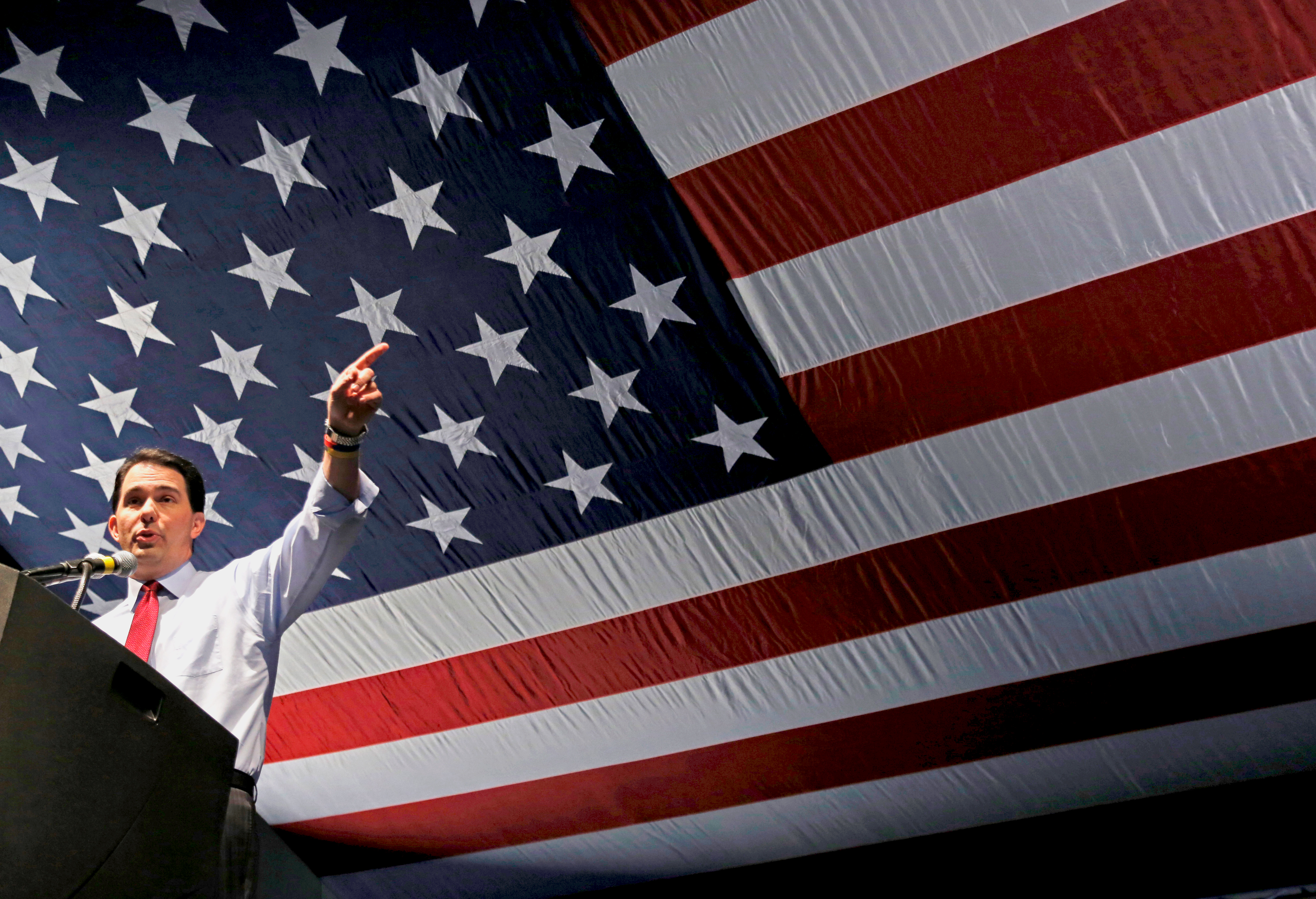Is Scott Walker the hero the conservative movement has been waiting for?
The Wisconsin governor fits right into the story conservatives like to tell themselves


Unlike Rand Paul, Wisconsin Gov. Scott Walker does not believe the GOP needs an ideological update. Unlike Marco Rubio, he doesn’t represent a more inclusive future for the party. Unlike Jeb Bush, he is not a known member of the Bush family.
That just about makes him the most natural candidate for the GOP in 2016. He fought in deep-blue Wisconsin on core conservative movement values — and he won. Finally, here is a true believer who is also competent at politicking and governing.
At least that’s the pitch that's being made this week, as Walker enjoys his first wave of 2016 buzz. It also puts him in a position to be the hero of a story conservatives tell about themselves.
The Week
Escape your echo chamber. Get the facts behind the news, plus analysis from multiple perspectives.

Sign up for The Week's Free Newsletters
From our morning news briefing to a weekly Good News Newsletter, get the best of The Week delivered directly to your inbox.
From our morning news briefing to a weekly Good News Newsletter, get the best of The Week delivered directly to your inbox.
America’s different ideological camps all use stories to explain where the country is today and why. Many progressives think things have generally just gotten worse, in all ways but social issues. Since the rise of Nixon and later Reagan, they see right-wing triumph everywhere. Tax rates falling, welfare rolls slashed, wages stagnating, inequality increasing, Koch brothers smiling. Obama appealed powerfully to liberals, and the 00’s “netroots” in particular, because he was cast as a transformational president like Reagan.
The conservative movement’s narrative is one of frustration. Liberal ideas are proven failures. Where conservative ideas have been tried, they have flourished: look at broken-windows policing in New York City, or the light-touch regulatory burden that makes Houston a magnet for middle-income families. More and more Americans call themselves conservatives. And conservatives have generally been good at putting Republicans in positions of power.
But instead of a massive downsizing of Washington to Swiss canton–size, the presidents conservatives elect sign stuff like The Americans with Disabilities Act, or Medicare Part D. They work with Teddy Kennedy on No Child Left Behind. These laws not only expand the reach of the federal government, but invite further liberal expansion in efforts like ObamaCare or Common Core.
Why? Some conservatives blame a Beltway culture of lobbyists and influence-peddling. Others cite a lack of courage and conviction. They say we need a “true conservative,” but with the stones to win.
A free daily email with the biggest news stories of the day – and the best features from TheWeek.com
This is where Scott Walker saunters in and casually tosses his cape over his shoulder. His “budget repair bill” was not just a conservative tweak of the tax code — it was a very canny effort to weaken public-sector unions in Wisconsin. Many were predicting that Wisconsin’s strong labor heritage, combined with a public backlash against Walker’s confrontational politics, would unseat him. Instead, he became the first governor in American history to survive a recall.
His story fits right into that self-flattering conservative narrative of frustration. Walker didn’t try to charm Wisconsin’s liberal establishment with some Kenny G-soft-jazz conservatism; he threw liberals into a dark cramped room and turned Metallica up to 11. He stood for what the movement believed in, and he won not just an election, but a structural reform of Wisconsin’s politics that tips the game-board in a conservative direction. He expanded school-choice initiatives. He did not set up an ObamaCare exchange in Wisconsin, rejecting federal dollars. He signed a Voter ID law. And then he won re-election in a state that went for Obama by 7 points.
This is the story that “movement” people of any type like to hear: if you show your backbone, explain yourself clearly and loudly, the people will rally behind you.
This isn’t to say that Walker doesn’t have challenges. Although the conservative movement’s views are widely shared across the party, the movement is not identical to the GOP. National parties tend to be more forgiving of (and even anxious to have) an unorthodox candidate after eight years of exile from the White House. This leaves an opening for a Jeb Bush, or if every butterfly across the globe flaps just right, a Rand Paul.
Walker has deficiencies of charm and geography compared to Marco Rubio. The Floridian senator is not only a more attractive stage presence, but far more likely to drag his state into the red column in a 2016 race. Rubio also at least provides the hope of moving the needle among non-Republican demographics in a way that Walker does not.
But after the 2010 and 2014 elections, the GOP may settle on a story that Romney was uniquely charmless and Obama uniquely charmed, and that the only change the party needs is a leader from the Republican wing of the Republican Party. Walker fits that bill.
Michael Brendan Dougherty is senior correspondent at TheWeek.com. He is the founder and editor of The Slurve, a newsletter about baseball. His work has appeared in The New York Times Magazine, ESPN Magazine, Slate and The American Conservative.
-
 China’s single mothers are teaming up
China’s single mothers are teaming upUnder the Radar To cope with money pressures and work commitments, single mums are sharing homes, bills and childcare
-
 Employees are branching out rather than moving up with career minimalism
Employees are branching out rather than moving up with career minimalismThe explainer From career ladder to lily pad
-
 ‘It is their greed and the pollution from their products that hurt consumers’
‘It is their greed and the pollution from their products that hurt consumers’Instant Opinion Opinion, comment and editorials of the day
-
 Has Zohran Mamdani shown the Democrats how to win again?
Has Zohran Mamdani shown the Democrats how to win again?Today’s Big Question New York City mayoral election touted as victory for left-wing populists but moderate centrist wins elsewhere present more complex path for Democratic Party
-
 Millions turn out for anti-Trump ‘No Kings’ rallies
Millions turn out for anti-Trump ‘No Kings’ ralliesSpeed Read An estimated 7 million people participated, 2 million more than at the first ‘No Kings’ protest in June
-
 Ghislaine Maxwell: angling for a Trump pardon
Ghislaine Maxwell: angling for a Trump pardonTalking Point Convicted sex trafficker's testimony could shed new light on president's links to Jeffrey Epstein
-
 The last words and final moments of 40 presidents
The last words and final moments of 40 presidentsThe Explainer Some are eloquent quotes worthy of the holders of the highest office in the nation, and others... aren't
-
 The JFK files: the truth at last?
The JFK files: the truth at last?In The Spotlight More than 64,000 previously classified documents relating the 1963 assassination of John F. Kennedy have been released by the Trump administration
-
 'Seriously, not literally': how should the world take Donald Trump?
'Seriously, not literally': how should the world take Donald Trump?Today's big question White House rhetoric and reality look likely to become increasingly blurred
-
 Will Trump's 'madman' strategy pay off?
Will Trump's 'madman' strategy pay off?Today's Big Question Incoming US president likes to seem unpredictable but, this time round, world leaders could be wise to his playbook
-
 Democrats vs. Republicans: who are US billionaires backing?
Democrats vs. Republicans: who are US billionaires backing?The Explainer Younger tech titans join 'boys' club throwing money and support' behind President Trump, while older plutocrats quietly rebuke new administration
